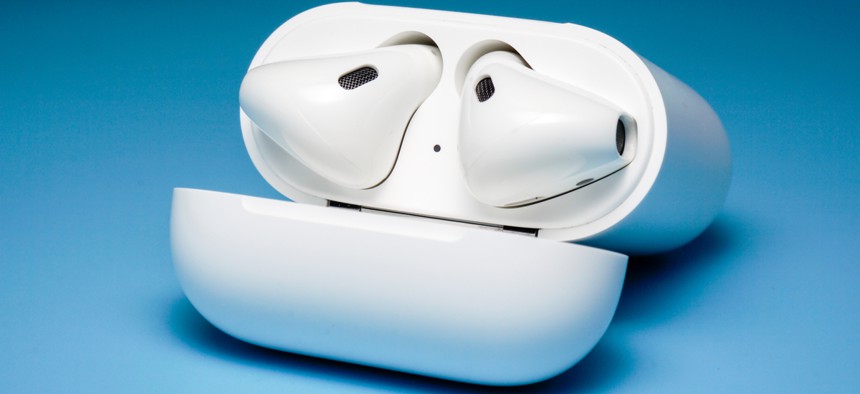What Happens When You Always Wear Headphones

Mohd Syis Zulkipli/Shutterstock.com
I decided to noise-cancel life.
I own three pairs of noise-canceling headphones. Two go over my ears, enveloping them in cozy tombs of silence. One pair consists of earbuds, one of which I jam into my ear to block out the world while I use my other ear for phone interviews. Besides the noise-canceling kind, I have headphones for basically every activity I do. In fact, I recently came to the disturbing realization that there’s rarely a moment of my day when my ears are not filled with or covered by something.
Like many other Americans, I now wear AirPods all day at my desk to combat the awful tyranny of the open office. Since they don’t cancel noise, they provide me with writing music while allowing me to listen up for my bosses. I don’t like exercise classes and their preselected, generic playlists, so instead I work out with headphones and listen to my own special running mix, the contents of which can be disclosed only upon my death. (Let’s just say the dream of the ’90s is alive on my Spotify.) I like to listen to podcasts while I cook, so the earbuds come in handy while I chop and sauté. And I can hook up headphones to a Roku when I want to watch a depressing foreign TV show and my boyfriend wants to do literally anything else.
Right now I’m sitting in an airport. Three bearded men are chuckling next to me, and they look like a buddy comedy with the sound muted. It’s delicious. I’ve become one of those people who stalk tech-review sites for the “best” noise-canceling technology—extra points go to headphones that are good for “all-day wear.” The noise-canceling headphones are sometimes necessary for work, but they are also necessary because I live in a one-bedroom apartment with two cellos. My boyfriend, the cello owner, makes little noises while he putters around, which distracts me from reading my 20,000-word long-form articles about Iraq. So I noise-cancel him too.
Our apartment was one of the cheapest in the building because we have a direct, unobstructed view of the garbage-truck entrance. On top of the clamor of trash collection, we have lately also been subjected to some sort of predawn construction project that, as far as I can tell, involves smashing two large, metal blocks together repeatedly.
Because of this, I’ve started wearing earplugs to sleep every single night. And because I’ve now conditioned myself, Pavlovian-style, to associate earplugs with sleep, I have to wear them when I’m sleeping in a hotel too. This habit apparently comes with some health risks, but so does not getting enough sleep, and at this point, those are pretty much my two options. (There also exist special sound-blocking headphones for sleep, but I haven’t reached that level yet.)
I sometimes wonder what 19th-century time travelers would think if they were to look at my life, or even just my ears. No doubt they might be alarmed, as were the original critics of foam-padded Walkman headphones, when those became a cultural force in the early 1980s. “Some see the growing headphone movement as ‘socially alienating’ and ‘destructive of relationships’ and its members as ‘status seekers’ and ‘elitists,’” The New York Times pointed out in 1981. One town even passed an ordinance banning headphones on its streets.
To those who lived before headphones, it might seem as though I want to exist in the world without actually being part of it. And to some extent, that’s true. Urban Millennials like me don’t inhabit a world that allows for much privacy. We’ve been squeezed into closely packed offices, closely packed subway cars, and closely packed apartments. Everyone else’s noises are constantly everywhere, so your head is the only personal space you can get. Granted, I share it with Brian Eno and Twin Shadow, but at least the choice is mine.
This auditory selectivity is, in some ways, part of a trend toward bespoke experiences, particularly in upper-middle-class life. Many Americans don’t befriend their neighbors anymore; they befriend people with their same hobbies and interests. We don’t date the girl next door; we date the girl who has been served up by an assortative algorithm. With the help of Facebook, we read the news we want to read instead of the news we should. Social media connected us, and then the connection grew too close for comfort, so now we “cancel” those we don’t want to hear from.
I realize the dangers inherent in this overall trend—I might even go so far as to call it “socially alienating” and “destructive of relationships”—but I nevertheless feel it’s inexorable. At this point, everything is curated—except, of course, what we hear. And as long as unfamiliar sounds are going to be foisted on me all day, it feels good to draw a private, firm border. The buck stops at my cochlea.
Just like we choose everything else, I choose exactly what to put in my ears. All other noise is canceled.
NEXT STORY: Kids Might Close Government’s IT Talent Gap





